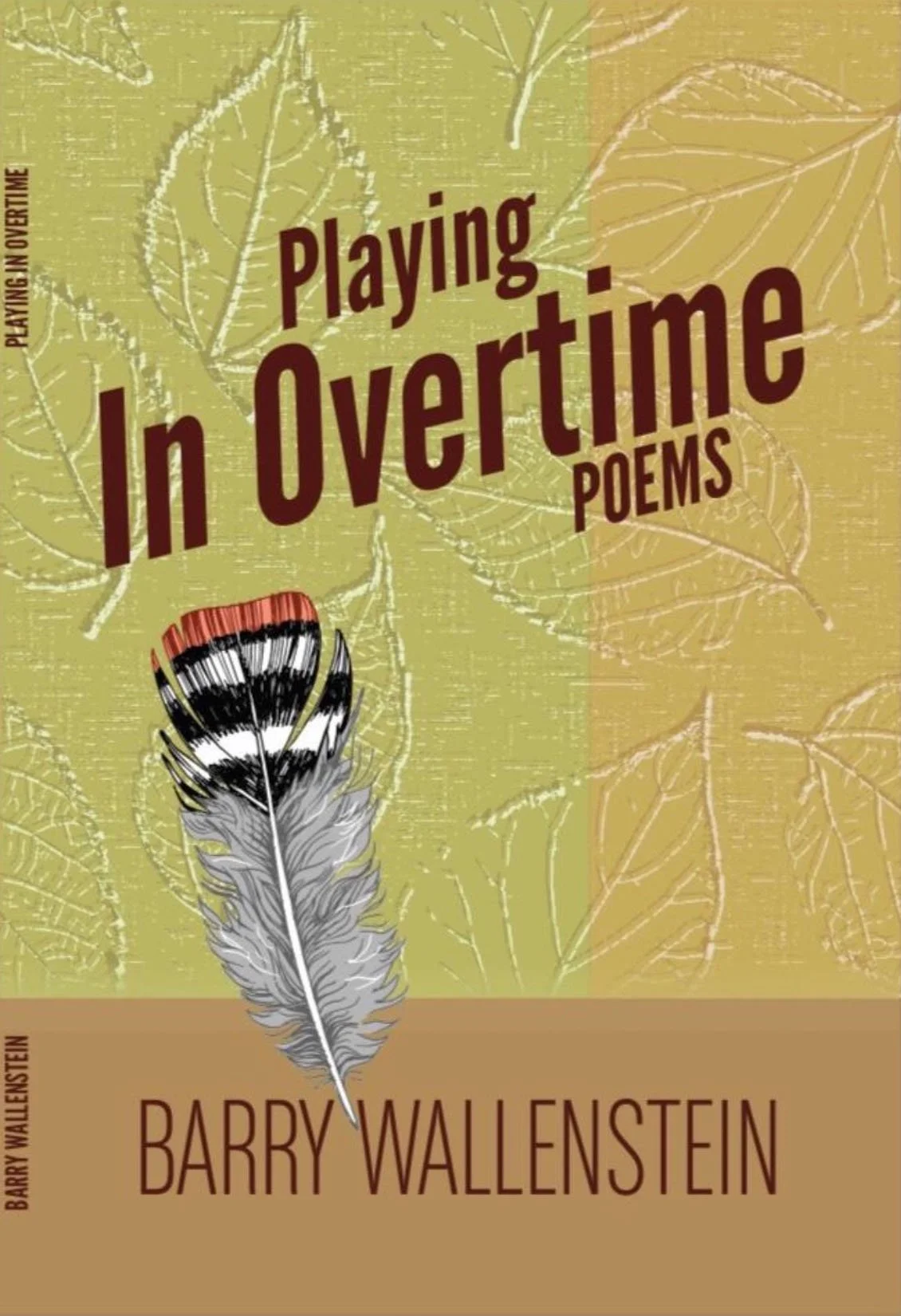Playing in Overtime: Poems

Playing in Overtime: Poems, by Barry Wallenstein. Detroit, MI: The Ridgeway Press, 2025, 62 pp. $18 (paperback)
Now in his eighties, Barry Wallenstein, the author of numerous collections of poems, approaches the poem in a way that is agile and sure-footed; he has a lightness of touch and an ability to encounter the moment with a complete lack of pretentiousness. In this collection, however, and especially in its final section, “Playing in Overtime,” he is doing so while confronting an abyss:
Every inch forward upon the going on trail
is one inch closer to the go-no-further
signpost – where the trail meanders
to its terminal ledge.
A crowd of beasts – humans included –
is pressing close to the edge
with its sudden drop
into where
(“His November,” p. 47)
Wallenstein’s technique in poems such as this one is unobtrusive, but note the subtlety of the enjambment of line 2 and how the letters in “on” of line 1 are reversed by those in “no” of line 2; note also the subtle rhyme of “ledge” and “edge,” where the change of a single letter transforms the comfort of the one into the danger of the other; and note how the “sudden drop / into where,” in which “nowhere” would have been a more predictable terminus, breaks our expectations. It has become a kind of cliché to end poems without a period, but here it is justified because this poem really does end without ending. Either “where” begins a locution that is not actually given to us or it signifies that in our ordinary usage “nowhere” too easily turns nothing into something. It gives the poem a kind of philosophical weight. Only through its title, “His November,” do we recognize that the poem has been precipitated by a crisis of some kind, one that is distanced, however, by the use of the third-person pronoun. November is the penultimate month of the year, but Wallenstein is not a symbolist, and so the naming of the month probably registers an empirical event or series of events on which the poem itself refuses to elaborate because it does not want to unfold a merely personal trauma; it is sure-footed in following its own “trail.” The word “terminal” keeps growing in meaning as we read and reread.
The abyss confronting the poet, especially in the “Playing in Overtime” section, poses a poetic as well as a human challenge because Wallenstein is fundamentally a poet who flows with the moment. This accounts for his lightness of touch and also for his interest in jazz: Wallenstein’s readings are often accompanied by jazz performances, and his rhythms are inflected by jazz rhythms. But with the appearance of the abyss, the moment itself is put into question; hence the preoccupation with time and memory in many of these poems, as well as a kind of spiritual counter-movement that wants to reverse course and simply flow with the time rather than burdening it by subjecting it to scrutiny.
One of the finest poems in the collection, “‘Hereafter,’” seems, as the scare quotes indicate, to raise the concept of the hereafter while simultaneously putting it under erasure. The poem has an epigraph from Job: “Man that is born of woman is of few days and full of trouble. He comes like a flower and is cut down. He flees also like a shadow and continues not” (14:1-2). (Incidentally, I prefer the King James Version’s “as” to the banal and inaccurate “like” of this contemporary translation.) In this poem, Wallenstein’s characteristic lightness of touch has to negotiate a weighty interrogation not only of the concept of the hereafter but also of the poet’s relation to the word itself:
After, as in hereafter, annuls the here,
though it may be apt when prefaced by ever.
With ever after the heart pumps promise,
whereas hereafter spins on a pin.
The word confounds the senses
unmoored from the rational,
tethered to the sublime:
“until we meet again. . . .”
The ghosts approach the gates,
some pull themselves up and over,
some just sail beyond
and may achieve afterness,
while those of us still here
nevertheless, glance forward.
(p. 60)
“The word confounds the senses.” Wallenstein is asking, skeptically, whether in doing so it retains meaning; like Kant, he has “tethered” it (“tethered” is a beautiful word) to the sublime, but unlike Kant he sees it as “unmoored from the rational”: for Kant in the “Analytic of the Sublime,” reason is able to conceive as an idea what the senses cannot experience. The “ghosts” in this poem are at once real and unreal. The poet, insisting on “the here,” cannot fully invest his belief in them, but nevertheless is able to speak for those who “glance forward.” “‘Hereafter’” is, I think, a real and substantial achievement.
Wallenstein remains a poet of experience, however. In “Recollection,” another of my favorite poems in the book, he meditates on how experience is converted to memory, on what remains and what is lost. And he concludes:
I remember their faces around the table
but no longer the topics or the names.
My mind is a sieve.
Yet all that happened did happen:
the flirtations, the couplings
and the folds in the fabric,
entire episodes.
(p. 55)
“My mind is a sieve” comes in awkwardly and seems unnecessary; but I love the emphatic, optimistic quality of “Yet all that happened did happen” and the beautiful metaphor of “folds in the fabric,” which makes it seem as if experience were literally inscribed in the brain. Wallenstein knows what he knows and what he does not know. May he be given many more poems to share with us.
Reviewer Henry Weinfield's most recent collection of poems is An Alphabet (Dos Madres Press, 2022). He has recently completed a translation of the selected poems of Giacomo Leopardi.